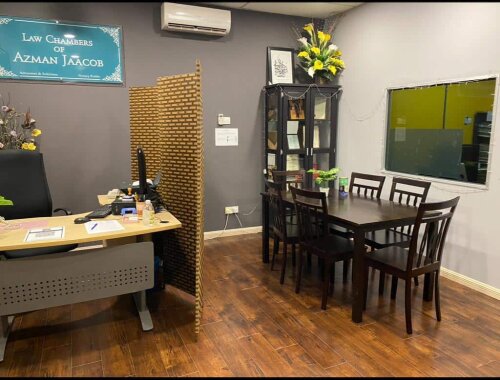Best Criminal Defense Lawyers in Putrajaya
Share your needs with us, get contacted by law firms.
Free. Takes 2 min.
List of the best lawyers in Putrajaya, Malaysia
About Criminal Defense Law in Putrajaya, Malaysia
Criminal defense law in Putrajaya, Malaysia, deals with legal protections and defenses afforded to individuals who have been charged with criminal activities. The Federal Territory of Putrajaya serves as the administrative center of Malaysia, and it's governed by the same set of laws and regulations that apply throughout the country. The Malaysian legal system is based on a combination of civil law principles and common law, which can be particularly sophisticated. Criminal defense lawyers in Putrajaya are deeply knowledgeable about both procedural and substantive criminal law, defending the rights of the accused and ensuring fair trials.
Why You May Need a Lawyer
There are numerous situations where hiring a criminal defense lawyer in Putrajaya could be essential. If you are facing charges of theft, assault, drug offenses, driving under the influence (DUI), or any other criminal action, it is crucial to seek legal assistance. Individuals may also require a criminal defense lawyer when they have been unfairly questioned by police, experienced unlawful searches and seizures, or received notices to appear in court. A lawyer can provide valuable guidance and representation from the initial arrest through trial, if necessary, and help navigate plea bargaining or appeals.
Local Laws Overview
The Penal Code in Malaysia forms the foundation of criminal law and outlines various offenses and corresponding penalties. The Criminal Procedure Code governs the process during criminal investigations, trials, and appeals. Specific to Putrajaya, as the seat of the federal government, compliance with federal regulations is critical. Individuals need to be aware of their basic rights when being investigated, which include the right to remain silent and the right to consult a lawyer. Also, capital punishment is still practiced in Malaysia for certain offenses, highlighting the severity of criminal law proceedings.
Frequently Asked Questions
What should I do if I am arrested in Putrajaya?
If you are arrested, it’s important to remain calm and polite. Do not resist arrest and immediately request to speak with a lawyer. Know that you have the right to remain silent and should exercise that right until legal representation is present.
What rights do I have when accused of a crime?
As an accused, you have the right to know the charges against you, the right to remain silent, the right to legal representation, and the right to a fair trial. You should be informed of these rights promptly by law enforcement.
How soon can I contact a lawyer?
You can and should contact a lawyer as soon as possible after being detained or charged. It’s crucial to ensure that your rights are protected from the outset.
What is bail, and how is it set?
Bail is a sum of money or property deposited to ensure that a defendant returns for their trial. It is set by the judge, and decisions are made based on factors like the nature of the crime, character of the defendant, and risk of fleeing.
Can a lawyer help if I am guilty?
Yes, a lawyer can negotiate deals such as plea bargains, which may lead to reduced charges or a lighter sentence. They will also ensure that your legal rights are safeguarded throughout the process.
What is the difference between a misdemeanor and a felony?
In Malaysia, the equivalent of misdemeanors would be less serious offenses often called "minor offenses," while felonies are more serious crimes that carry more severe penalties.
What are preliminary inquiries?
Preliminary inquiries are hearings to determine whether there is enough evidence to proceed to trial. They are vital in ensuring that weak or baseless cases are dismissed early.
How long does a criminal case take to resolve?
The duration of a criminal case can vary widely depending on the complexity of the case, court schedules, and whether it goes to trial. Cases can take from several months to several years to resolve fully.
What can I expect during a trial?
During a trial in Putrajaya, the prosecution will present evidence and witnesses to prove the charges. Your lawyer will have the opportunity to cross-examine witnesses, introduce defense evidence, and make legal arguments.
Is it possible to appeal a conviction?
Yes, if you believe that legal errors affected the verdict or sentencing, you may have grounds for an appeal. An experienced lawyer will be vital in navigating the appeal process.
Additional Resources
Those seeking further information on criminal defense may find the following resources valuable: the Malaysian Bar Council, Legal Aid Centers, and the Yayasan Bantuan Guaman Kebangsaan (National Legal Aid Foundation). Engaging with governmental bodies such as the Attorney General's Chambers or the Royal Malaysia Police can also be crucial for specific inquiries related to criminal proceedings.
Next Steps
If you are in need of legal assistance regarding criminal defense in Putrajaya, it is important to seek out a qualified lawyer with experience in Malaysian criminal law. Begin by reaching out to legal aid organizations or contacting a professional criminal defense firm. Quick action and informed decisions can make a significant difference in the outcome of your case. Always prioritize finding a lawyer who is knowledgeable, trustworthy, and able to communicate clearly with you about your options and obligations under Malaysian law.
Lawzana helps you find the best lawyers and law firms in Putrajaya through a curated and pre-screened list of qualified legal professionals. Our platform offers rankings and detailed profiles of attorneys and law firms, allowing you to compare based on practice areas, including Criminal Defense, experience, and client feedback.
Each profile includes a description of the firm's areas of practice, client reviews, team members and partners, year of establishment, spoken languages, office locations, contact information, social media presence, and any published articles or resources. Most firms on our platform speak English and are experienced in both local and international legal matters.
Get a quote from top-rated law firms in Putrajaya, Malaysia — quickly, securely, and without unnecessary hassle.
Disclaimer:
The information provided on this page is for general informational purposes only and does not constitute legal advice. While we strive to ensure the accuracy and relevance of the content, legal information may change over time, and interpretations of the law can vary. You should always consult with a qualified legal professional for advice specific to your situation.
We disclaim all liability for actions taken or not taken based on the content of this page. If you believe any information is incorrect or outdated, please contact us, and we will review and update it where appropriate.
Browse criminal defense law firms by service in Putrajaya, Malaysia
Putrajaya, Malaysia Attorneys in related practice areas.










